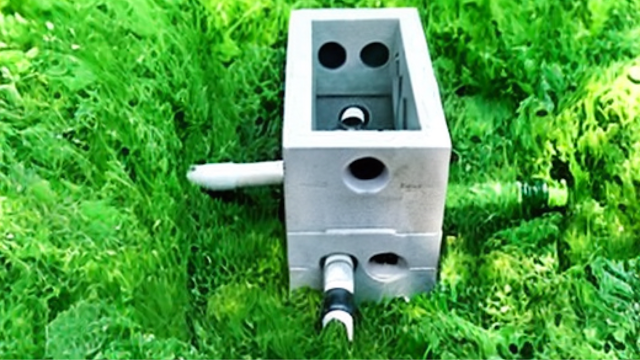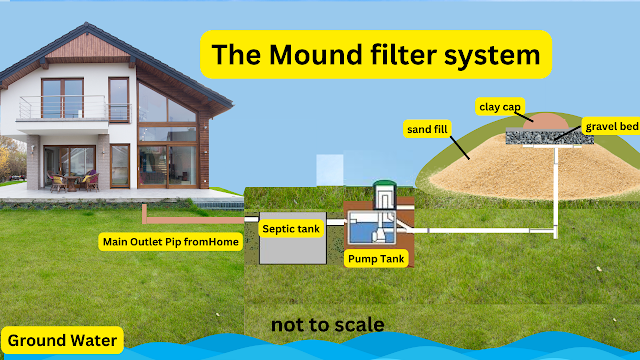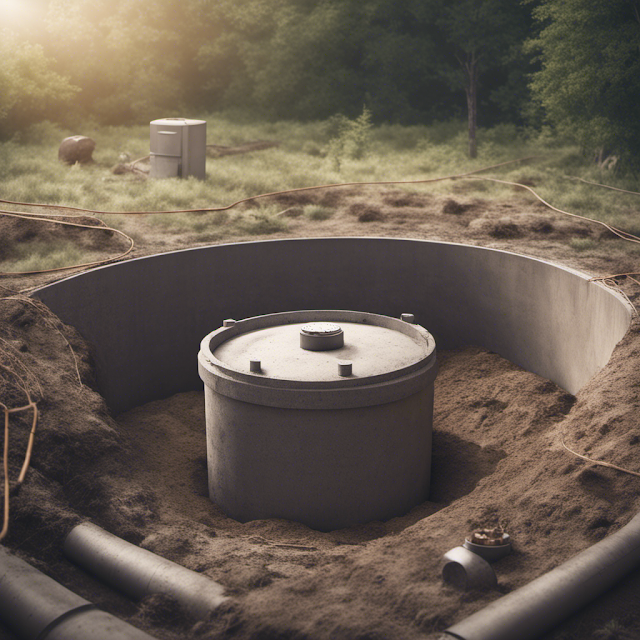How Much Does it Cost to Get a Septic Tank Pumped in 2023
 |
| How Much Does it Cost to Get a Septic Tank Pumped in 2023-will you be shocked with price increases! |
I. Introduction
A. Explanation of septic tank pumping
Septic tank pumping is a crucial process that involves the removal of accumulated solid waste, sludge, and effluent from a septic tank. This is an essential aspect of maintaining a septic system, which is a self-contained wastewater treatment setup typically installed in rural areas or properties without access to municipal sewage systems. By pumping out the solid waste and sludge, the septic system's performance is optimized, and the risk of damage or contamination to the environment is minimized. Septic tank pumping should be carried out by professionals, as they have the necessary equipment and expertise to perform the job safely and efficiently.
If you're a homeowner with a septic tank system, you're in luck because we've got some insider knowledge to share with you! With over 40 years of combined experience in the septic tank industry, my wife Jeane and I have encountered a wide range of scenarios and challenges. We're passionate about sharing our valuable insights with you, from the hazards of septic system maintenance to tips on choosing the right system for your needs.
Whether you're a seasoned septic tank owner or a newcomer to septic systems, our DIY advice from industry experts will give you the confidence you need to keep your system in top shape. So, read on for some expert tips that you won't want to miss out on!
Also, maybe even save you some money on your when looking at how many does it cost to get a Septic Tank pumped in 2023
B. Importance of regular pumping
Ensuring regular septic tank pumping is essential for several reasons. Primarily, it prevents system failure, which could result in sewage backup, foul odors, and costly repairs. It also ensures proper waste treatment and disposal, safeguarding groundwater and local ecosystems from contamination. Moreover, regular pumping prolongs the life of your septic system, reducing the need for expensive replacements or upgrades. Finally, adhering to a pumping schedule can help you avoid legal issues, as many local regulations require homeowners to maintain their septic systems properly.
C. Factors affecting the cost of septic tank pumping
Several factors influence the cost of septic tank pumping. These factors include the size of the tank, the system's location, accessibility, and the amount of sludge and solid waste present in the tank. Additional costs, such as inspection fees, repairs, and permit fees, may also apply. It is essential to be aware of these factors when budgeting for septic tank maintenance, as understanding the variables can help you make informed decisions and potentially save money in the long run.
II. Understanding Septic Systems
A. How septic systems work
Septic systems serve as an alternative to municipal sewage systems, providing self-contained wastewater treatment for homes and properties. They function by separating solid waste and liquid effluent in a septic tank, with the solids settling at the bottom and forming sludge. The liquid effluent then flows into a drain field, where it is filtered through layers of soil and gravel, allowing natural processes to break down contaminants before they reach the groundwater.
A septic system's efficiency depends on several factors, including the size of the tank, the design of the drain field, and the frequency of maintenance. Properly functioning septic systems protect public health and the environment by preventing untreated wastewater from contaminating groundwater sources.
B. Types of septic systems
There are various types of septic systems available, each with unique designs and functions. The most common types include:
Conventional septic systems: These systems consist of a septic tank and a drain field, where gravity helps move effluent through the system. Conventional systems are suitable for properties with adequate space and suitable soil conditions.
Chamber systems: These systems use large, open-bottom chambers instead of traditional drain field pipes. This design promotes greater contact between effluent and soil, potentially improving treatment efficiency.
Drip distribution systems: Drip distribution systems utilize a series of small-diameter pipes to distribute effluent evenly throughout the drain field. This design is particularly suitable for properties with shallow or poor-quality soil.
Aerobic treatment units (ATUs): ATUs incorporate an aeration process that increases the breakdown of waste material, producing cleaner effluent. These systems are ideal for properties with limited space or challenging site conditions.
C. Components of a septic system
A septic system is composed of three main components: the septic tank, the drain field, and the connecting pipes. The septic tank is usually made of concrete, fiberglass, or polyethylene and serves as the first stage of wastewater treatment. Wastewater from the household flows into the tank, where solid waste settles to the bottom, forming sludge, while lighter materials like grease and oils rise to the top, creating a layer of scum. Anaerobic bacteria in the tank help break down the solid waste.
The drain field, also known as the leach field or absorption field, is the second stage of the treatment process. It consists of perforated pipes laid in gravel-filled trenches or beds, which allow the liquid effluent to seep into the soil. The soil acts as a natural filter, removing harmful bacteria, viruses, and nutrients from the effluent before it reaches the groundwater.
Connecting pipes transport wastewater from the house to the septic tank and from the tank to the drain field. Proper installation and maintenance of these pipes are essential to prevent leaks and ensure the efficient operation of the septic system.
 |
| diagram of a septic tank |
III. Signs Your Septic Tank Needs Pumping
A. Slow drainage
One of the most common signs that your septic tank needs pumping is slow drainage in your home. If you notice that sinks, showers, and toilets are draining more slowly than usual, it could indicate that your septic tank is nearing capacity. A full tank can cause wastewater to back up into your plumbing system, leading to slow drainage and potential damage.
B. Foul odors
Unpleasant smells emanating from drains, toilets, or the area around your septic system can be another indication that your septic tank needs attention. Foul odors often result from a buildup of waste materials and gases in the tank, which can escape through plumbing fixtures or permeate the soil around the system.
C. Sewage backup
A sewage backup in your home is a clear and urgent sign that your septic tank is full or that your system is experiencing issues. Sewage backup can cause significant damage to your property and pose serious health risks. Immediate septic tank pumping and inspection are necessary to resolve this problem and prevent further complications.
D. Lush grass or algae growth
.png) |
| Septic Tank Problem? Greener than green not a good sign |
An unusually green and lush lawn or excessive algae growth around your drain field could signify that your septic tank is overflowing or not functioning correctly. When a septic tank is full, effluent can seep into the surrounding soil, providing excess nutrients that promote plant and algae growth. Pumping your septic tank and addressing any underlying issues can prevent further damage to your system and the environment.
E. Gurgling sounds
Gurgling noises emanating from your plumbing system may indicate that your septic tank is full and needs pumping. These sounds can result from trapped air in the pipes or wastewater struggling to flow through a blocked or overloaded system. Scheduling septic tank pumping can help alleviate this issue and restore proper function to your plumbing system.
IV. Cost of Septic Tank Pumping
A. National average cost
In 2023, the national average cost for septic tank pumping ranges from $250 to $500, with most homeowners paying around $375. This cost includes the removal and disposal of waste materials, as well as the labor and equipment necessary to complete the job. It is essential to note that these figures are only estimates and may vary depending on factors such as location, tank size, and accessibility.
B. Factors affecting the cost
1. Tank size
Larger tanks require more time and effort to pump, which can lead to higher costs. Conversely, smaller tanks may be less expensive to pump, although they may need more frequent servicing. The size of your septic tank will directly impact the cost of pumping, so it's essential to know your tank's capacity to budget accurately.
2. Location
The location of your septic system can also influence the cost of pumping. If your tank is situated far from the service provider's base or in a remote area with limited access, you may be charged additional fees for travel time and fuel. Conversely, if your septic system is easily accessible and close to the service provider, the cost may be lower.
3. Accessibility
The ease with which your septic tank can be accessed directly affects the cost of pumping. Obstructions such as landscaping, decks, or structures covering the tank can make the job more challenging and time-consuming, leading to higher costs. Ensuring that your tank is easily accessible can help reduce the expense of pumping.
4. Level of sludge
The amount of sludge and solid waste present in your septic tank can also impact the cost of pumping. A tank with a higher level of sludge may take longer to pump and require specialized equipment, leading to increased costs. Regular pumping and maintenance can help prevent excessive sludge buildup, reducing the cost of future pumping services.
C. Additional costs
1. Inspection fees
In some cases, a septic tank pumping service may include a basic visual inspection of the system. However, a more thorough inspection, involving the use of specialized equipment such as cameras or soil probes, may incur additional fees. Regular inspections are essential for identifying potential issues early and ensuring the efficient operation of your septic system.
 |
| Septic Tank Man Smiling as he adds up your pumping cost |
2. Repairs
If your septic system requires repairs, such as fixing leaks, replacing damaged components, or addressing drainage issues, you may face additional costs beyond the basic pumping fee. It's crucial to address repairs promptly to prevent further damage and protect your property and the environment.
3. Permit fees
Some local jurisdictions may require homeowners to obtain permits for septic tank pumping or other maintenance activities. These permits can involve fees that add to the overall cost of septic system maintenance. Be sure to check with your local health department or regulatory agency to determine whether permit fees apply in your area.
V. DIY vs. Professional Septic Tank Pumping
A. Pros and cons of DIY pumping
While attempting to pump your septic tank yourself may seem like a cost-saving measure, it's generally not recommended for several reasons. First, DIY pumping can be hazardous, as exposure to untreated wastewater carries health risks. Additionally, improper waste disposal can lead to environmental contamination and potential legal issues. Furthermore, without professional experience and equipment, you may inadvertently damage your septic system, leading to costly repairs or even system failure.
On the other hand, if you possess the necessary knowledge, equipment, and expertise to pump your septic tank safely and correctly, DIY pumping can save you money on service fees. However, the risks and challenges involved make it a less advisable option for most homeowners.
B. Pros and cons of professional pumping
Hiring a professional septic tank pumping service offers numerous advantages. Professionals have the experience, equipment, and knowledge necessary to pump your septic tank safely and efficiently. They can also inspect your system for potential issues, recommend repairs, and ensure proper waste disposal.
The main drawback of professional pumping is the cost, which can be a significant expense for homeowners. However, the benefits of professional pumping, including the protection of your property, health, and the environment, often outweigh the costs.
VI. How to Choose a Septic Tank Pumping Company
A. Researching potential companies
When searching for a reputable septic tank pumping company, it's essential to do your homework. Start by asking for recommendations from friends, neighbors, or local online forums. Look for companies with a solid reputation and positive customer reviews. You can also consult the Better Business Bureau or other consumer protection agencies to check for any complaints or issues associated with potential service providers.
B. Questions to ask
Before hiring a septic tank pumping company, make sure to ask the following questions:
How long have you been in business?
Are you licensed, bonded, and insured?
What is included in your pumping service (e.g., inspection, waste disposal)?
What is the estimated cost of the service, and are there any additional fees?
Can you provide references or testimonials from satisfied customers?
Asking these questions will help you assess the professionalism and reliability of the company and ensure you receive quality service at a fair price.
C. Red flags to watch out for
When evaluating potential septic tank pumping companies, be on the lookout for red flags that may indicate poor service or potential problems. These include:
Extremely low prices: While it's essential to shop around for competitive rates, be wary of prices that seem too good to be true. A company offering significantly lower prices than others may be cutting corners, which could result in substandard service or damage to your septic system.
High-pressure sales tactics: Be cautious of companies that use high-pressure sales tactics or attempt to upsell you on unnecessary services. A reputable company will provide transparent pricing and allow you to make informed decisions without undue pressure.
Lack of credentials: Ensure the company you choose is licensed, bonded, and insured, as this demonstrates their commitment to professionalism and protects you from potential liability.
.png) |
| septic tank owners beware of smiley salespeople |
VII. Septic Tank Maintenance Tips
A. Regular pumping schedule
Adhering to a regular pumping schedule is crucial for the proper functioning and longevity of your septic system. Most experts recommend pumping your septic tank every 3-5 years, depending on factors such as tank size, household size, and water usage. Keep records of your pumping schedule and any maintenance performed on your system to ensure timely servicing.
B. Water conservation
Reducing your household's water usage can help prevent overloading your septic system and extend the time between pumping services. Implement water-saving measures such as installing low-flow fixtures, fixing leaks, and using water-efficient appliances to minimize the strain on your septic system.
C. Proper disposal of waste
Be mindful of what you flush down your toilets and pour down your drains, as improper waste disposal can lead to clogs, system damage, and the need for more frequent pumping. Avoid flushing items such as baby wipes, diapers, feminine hygiene products, and fats, oils, and grease. Use septic-safe toilet paper and cleaning products to protect your system.
D. Inspections
Regular septic system inspections can help identify potential issues early, allowing you to address problems before they escalate. Schedule professional inspections every 1-3 years, or more frequently if your system has experienced issues in the past.
E. Professional maintenance
In addition to regular pumping and inspections, consider hiring a professional septic system maintenance service to assess your system's overall health and efficiency. This service can help you identify and address any issues early, prolonging the life of your system and protecting your property and the environment.
VIII. Septic Tank Pumping FAQ
A. How often should I pump my septic tank?
The frequency with which you should pump your septic tank depends on factors such as tank size, household size, and water usage. Most experts recommend pumping every 3-5 years, but your specific needs may vary. Regular inspections can help determine the appropriate pumping schedule for your system.
B. How long does septic tank pumping take?
The time required for septic tank pumping depends on factors such as the size of the tank, the accessibility of the tank, and the amount of sludge and waste present. On average, septic tank pumping takes 1-2 hours to complete. However, more complex jobs or systems with extensive waste buildup may require additional time.
C. Can I pump my septic tank myself?
While it is technically possible to pump your septic tank yourself, it is generally not recommended. Septic tank pumping involves handling untreated wastewater, which poses health risks, and improper waste disposal can lead to environmental contamination and potential legal issues. Additionally, without professional experience and equipment, you may inadvertently damage your septic system, leading to costly repairs or even system failure. Hiring a professional septic tank pumping service is the safest and most effective way to maintain your system.
D. What happens if I don't pump my septic tank?
Failing to pump your septic tank can result in several problems. As the tank fills with sludge and solid waste, its efficiency decreases, which can lead to slow drainage, foul odors, sewage backup, and system failure. Additionally, an overloaded septic tank can contaminate the surrounding soil and groundwater, posing risks to public health and the environment. Regular septic tank pumping is essential for maintaining the proper function and longevity of your system.
E. How can I tell if my septic tank needs pumping?
There are several signs that your septic tank may need pumping, including slow drainage, foul odors, sewage backup, lush grass or algae growth around the drain field, and gurgling sounds in your plumbing system. If you notice any of these symptoms, it's essential to schedule septic tank pumping and inspection to address any underlying issues and prevent further complications.
IX. Conclusion
A. Importance of regular septic tank pumping
Regular septic tank pumping is crucial for maintaining the proper function, efficiency, and longevity of your septic system. Adhering to a consistent pumping schedule helps prevent issues such as slow drainage, foul odors, and sewage backup, while also protecting your property, health, and the environment from potential harm. By investing in regular septic tank maintenance, you can avoid costly repairs and prolong the life of your system.
 |
| smelly toilet septic tank needs pumping |
B. Summary of key takeaways
In summary, the cost of septic tank pumping in 2023 can vary significantly depending on factors such as tank size, location, accessibility, and the level of sludge present. While DIY pumping may seem like a cost-saving option, it's generally not recommended due to the risks and challenges involved. Hiring a professional septic tank pumping service offers numerous advantages, including safety, efficiency, and expert guidance on system maintenance.
To choose the right septic tank pumping company, research potential providers, ask important questions, and be on the lookout for red flags that may indicate poor service or potential problems. Maintain your septic system by adhering to a regular pumping schedule, conserving water, disposing of waste properly, scheduling inspections, and investing in professional maintenance.
C. Final thoughts
Your septic system is a vital component of your property and requires regular care and maintenance to ensure its optimal function. By understanding the factors that influence the cost of septic tank pumping, recognizing the signs that your tank needs pumping, and following best practices for system maintenance, you can protect your investment and enjoy the benefits of a well-functioning septic system for years to come. Remember, investing in the proper care and maintenance of your septic system is an investment in the health, safety, and well-being of your household and the environment.
.png)



.png)






Comments
Post a Comment